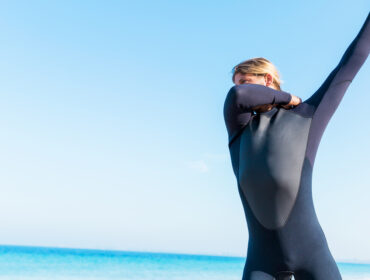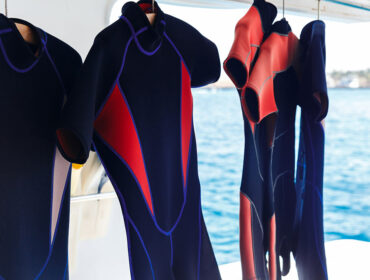No we are not refering to something dirty when we say “Scuba Booties Uncovered” so banish those thoughts from your head; Scuba Booties, also known as Scuba boots are a cross between neoprene socks and a shoe as they have soft neoprene upper-halves with a zipper on its side and hard bottomed soles that allow a diver to walk over rocks and other hard surfaces and protect the diver’s feet. Scuba Booties are used in combination with open heeled fins.
This seemingly insignificant item of scuba diving equipment should not be taken for granted, as it often can mean the difference between a comfortable dive and an unpleasant one. The right pair of scuba booties will help your dive be more comfortable, preventing your feet getting chaffed while finning and protecting your feet from sharp coral, rocks and other nasties.
Here are some of the things the humble dive booty can help with:
Protects your feet from Blisters and Chaffing
One of the primary benefits of wearing Scuba Booties is to protect your feet from blisters, fin bite or chaffing caused by the heel of your fin or fin strap constantly rubbing against the back of your heel. Those of you who have experienced these blisters, cuts or chaffed heels will surely attest to the fact that these can be awfully painful in the salt water and take a long time to heal. With the right pair of properly fitting dive boots, you don’t have to worry about getting chaffed while you are underwater.
Protect Your Feet from cuts and abrasions on the Shore and Underwater
The best part about owning booties is the ability to use them without the fins to protect your feet as you walk on the beach, or wade your way to your dive boat on the reef. Even on the dive boat, your booties will protect you from splinters, or nails keeping your feet safe. Those divers who perform surface dives, will attest to the benefits of wearing your booties as you enter the water until it becomes deep enough to don your fins and swim to your dive site. The shallows and rocky reefs have all kinds of nasty sharp things, such as Sea Urchins, Stonefish, sharp Coral, or rocks, broken glass etc, all of which could cause serious injury to your feet if stepped on.
Bare 7mm Coldwater Boot
Hot sand & Boat Decks
A good pair of booties will protect a diver’s feet from the blistering hot beach sand, a hot pavement or a scalding hot boat deck. While selecting a pair of boots for shore diving look for one with thicker soles often called ‘monster soles’ that will provide you with ample protection. Boat divers can opt for the thinner soled dive booties.
Deep See Beachwalker Men’s
Keep your Feet Warm in the Cold
If you are a cold water scuba diver, a pair of dive boots will add that extra layer of insulation and will help keep you feet warm. Dive boots are made of neoprene, like a wetsuit. and come in thickness ranging from 2mm to 7mm. As a rule of thumb, your boots should be the same thickness as your wetsuit or a couple of mm thicker since your extremities tend to get colder faster.
Well there you have it, the humble dive booties protect your feet from blisters and chaffing, keep your feet protected from cuts and abrasions, protect you from hot surfaces such as sand or pavement and also keep your feet warm in cold water. So the next time you’re planning to purchase a pair of fins, spare some thought to the benefits of diving with open heeled fins with dive boots and we’re sure you won’t ever dive without them!








